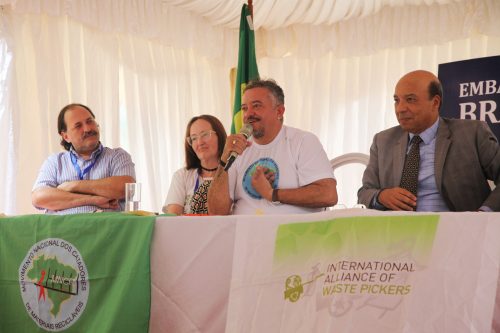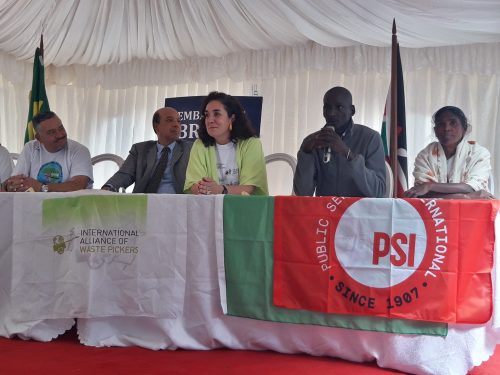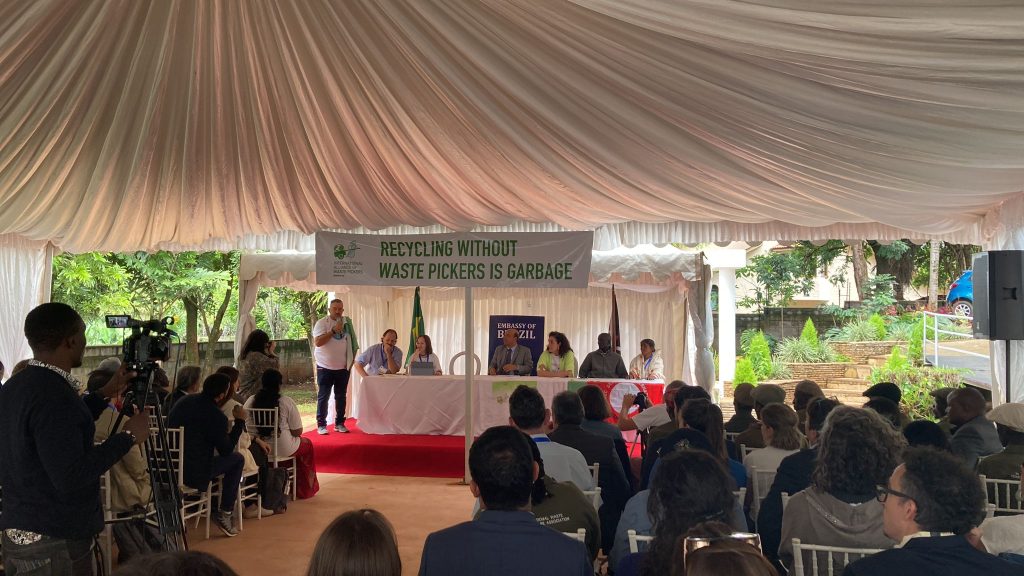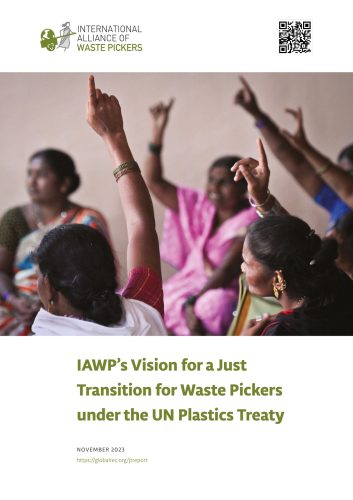The International Alliance of Waste Pickers (IAWP) celebrated a year of the constitution of the IAWP and presented its vision for a Just Transition for Waste Pickers under the UN Plastic Treaty. The event, held today in Nairobi, Kenya, brought together representatives from waste picker organisations from 34 countries, as well as allies from trade unions, academia, and government.
The event was well attended and had representation of allies from different organisations including trade unions. The event was attended by delegate members from Pakistan, Chile, Colombia, Norway, Uruguay, United States of America, Germany, Belgium.
This event has been possible with kind support of our partners UNICATADORES, WIEGO, University of St Andrews, and the generous hospitality of the Brazilian Embassy, especially Brazilian’s ambassador, Silvio Alburquerque, and all the workers in the Embassy.

Recognizing the Essential Role of Waste Pickers
In an address to the gathering, Lucia Fernandez, Acting General Secretary of the IAWP, highlighted the crucial role waste pickers play in waste management systems around the world. “Waste pickers are the backbone of waste management in many countries,” she said. “We collect, sort, and recycle millions of tons of waste every year, preventing it from ending up in landfills and oceans.”
Despite their vital contribution, waste pickers often face marginalisation, discrimination, and exposure to hazardous working conditions. The IAWP is calling for a Just Transition that ensures waste pickers are recognized for their work, provided with decent working conditions, and integrated into formal waste management systems.

A Vision for a Just Transition
The IAWP’s vision for a Just Transition includes the following key elements:
- Recognition of waste pickers within informal and cooperative settings in national, provincial, and municipal legislations and norms, policies and laws.
- Universal registration of waste pickers and other workers in plastics value chains.
- Transparency, oversight and adaptation
- Direct involvement and advancement in policy making and implementation processes
- Social and labour protections and safeguards
- Fair remuneration, living wages and sustainable livelihoods
- Formalization and strengthened organizing
- Capacity building and reskilling/upskilling and appropriate technology
- Improved materials management
The IAWP is urging governments, international organisations, and businesses to adopt a Just Transition approach that ensures waste pickers are not left behind in the transition to a circular economy.
“We cannot address the plastic pollution crisis without recognizing the vital contributions of waste pickers,” said Severino Lima Jr, UNICATADORES, Brazil. “We are calling for a just transition that includes us in decision-making processes, provides us with social protection, and invests in our livelihoods.”
The IAWP is calling on all the member states to support a just transition for waste pickers under the UN Plastic Treaty. “We urge governments, businesses, and individuals to stand with us in solidarity,” said Harouna Niass, Bokk Diom, Senegal. “Together, we can create a sustainable future that includes everyone.”
Quotes from waste picker and member state delegates
Waste Picker Delegates:
- Severino Lima Jr, UNICATADORES (Brazil): “If there were no waste pickers, then the world would be full of trash. Recycling without waste pickers is garbage if you’re going to put a waste collection and not include recyclers, it’s garbage.”
- John Chewya, KeNaWPWA (Kenya): “To the waste pickers in the house, I would like to say that this is an honour to you and this is to remind you of all of the work that you’ve been doing. To remind you that you are a hero in this world. It’s not only the people that you will see in the media that are portrayed as people who are protectors of this land. We have been those historical heroes that have not got a lot of celebration.”
- Kulsum, Bangladesh General Secretary of the West Bank of Bangladesh: “I’m here to assert that as waste pickers, we not only protect our communities, we clean our streets, we clean our cities and we protect the future of the earth, and yet there are many in society who still look down upon us, who still are blind to the fact that our services are essential and that we are leading the solutions on cleaning waste and addressing the plastics problem.”
- Pietro Luppi, Rete ONU (Italy): “We should be involved by initiative of the government in the policy making and the ensure making of circular economies.”
- Barbra Weber, Ground Score (USA): “Governments should track and report labour market trends to ensure that any reskilling or capacity building will be successful over the long term and should report on the outcome of the retraining efforts.”
Member state delegates:
- Valentina Sierra Representative of Uruguay Government: ”On behalf of the region of Latin America and the Caribbean region, We are actually taking into account your inputs and we are developing a group like proposal on just transition.”
- Erlend Arneson Haugen representative of the Norwegian delegate: “I also wanted to draw your attention to a report that was commissioned by Norway and developed by UN Habitat and the Norwegian Institute for Water Research titled Just Transition for the Informal Sector under Plastic, where the report specifically mentions the role of Waste Pickers in the recycling economy”
- Dr. Zaigham Abbas, representative of the Government of Pakistan: “In Pakistan we have many many waste pickers and they are collecting the material particularly pet bottles and that is the raw material for the industry. Industries are making staple fibres from pet bottles. So all credit goes to the waste pickers and they are important in our society and they are saving and to protect our environment as well as the resources which they collect from the garbage and make it accessible to the industry.”
- Macarena Quesada from the Chilean Delegation said: “as Chile, we acknowledge that work and we also support what you’ve been saying.”
- Andrés Duque Solís, Colombian delegate: “So we have heard very loud and clear your call to include you by name as waste picker in the instrument.”
- Claire Romano, United States government: “The United States government very much is supportive of a just transition as part of this treaty.”

IAWP’s Vision for a Just Transition for Waste Pickers under the UN Plastics Treaty

The IAWP position paper on Just Transition for Waste pickers outlines the essential steps that need to be taken to ensure that the transition to a circular economy for plastics is fair and inclusive for all workers, particularly waste pickers. These steps include:
- Recognizing and formalising the role of waste pickers in the plastic waste management system.
- Providing social protection and decent work conditions for waste pickers.
- Investing in training and capacity building for waste pickers.
- Ensuring that waste pickers have a meaningful say in the design and implementation of plastic waste management policies and programs.
Waste pickers are essential to the global plastic waste management system. They collect and sort recyclable materials, which helps to reduce pollution and conserve resources. However, waste pickers often work in hazardous conditions and are denied basic labour rights.
Tweet

